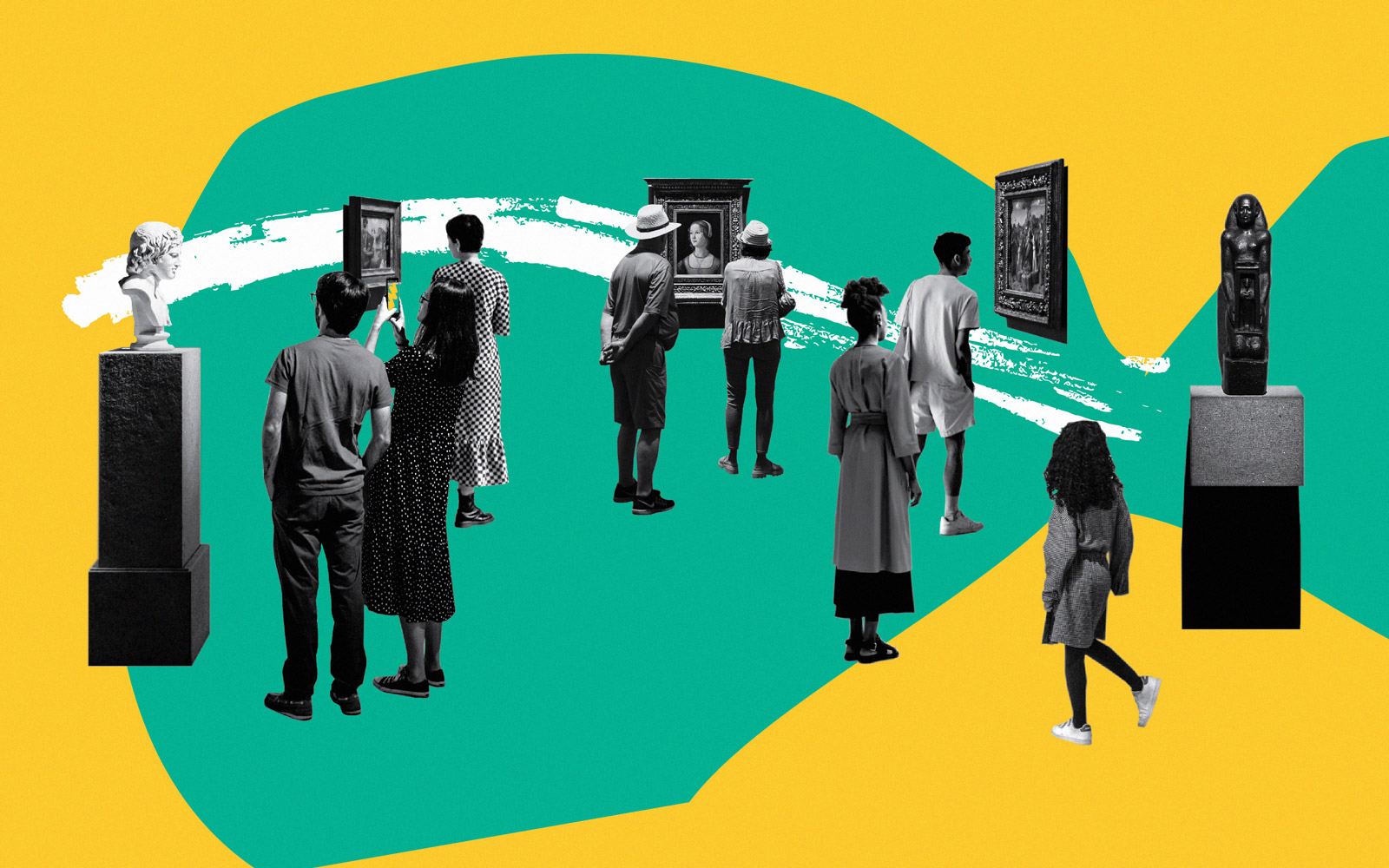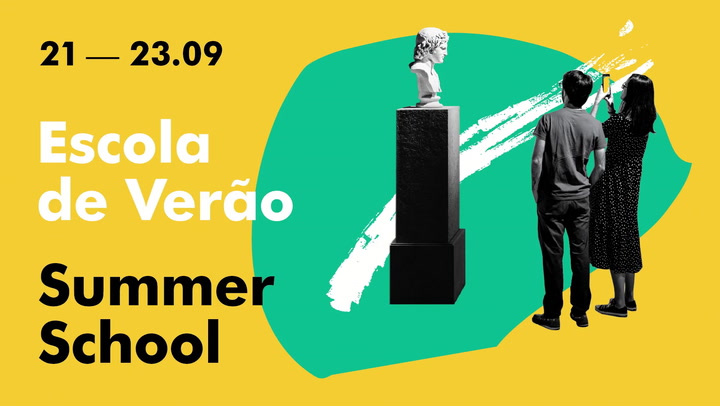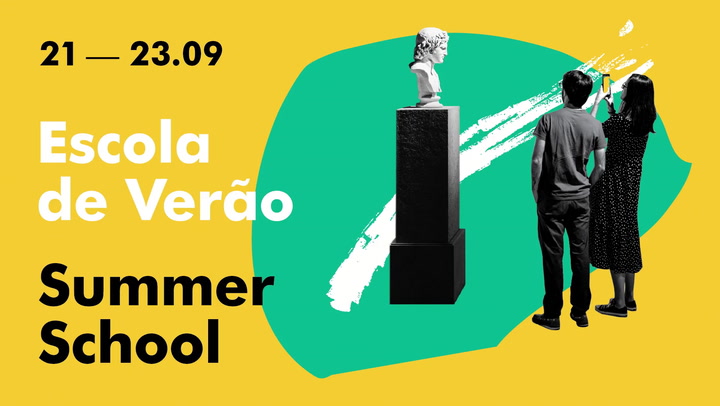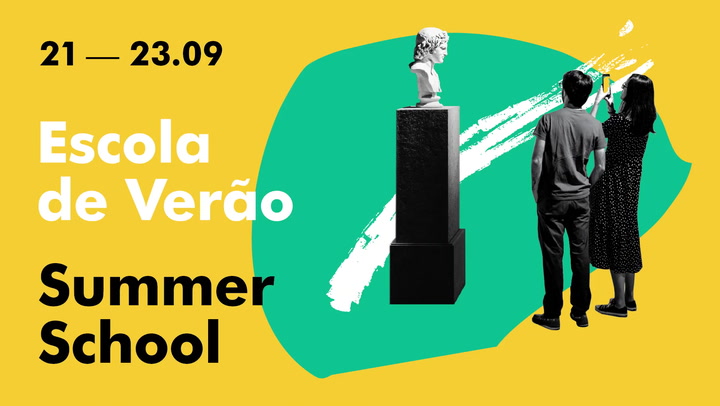Summer School 2022
Museums and Communication
Event Slider
Date
- / Cancelled / Sold out
BROADCAST
This event will be broadcast live on this page (in Portuguese only).
Following the success of its first edition this year’s theme is Museums and Communication.
Between 21 and 23 September, national and international specialists will debate several issues regarding this theme: What’s the role of technology? How is research shared with visitors and audiences? What is the importance of marketing and social media in museum communication? What new possibilities can be created by the increasing demands of the online world?
This event brings together different perspectives and approaches, promoting dialogues between all participants.
TRANSMISSION
21 Sep session
22 Sep session
23 Sep session
Programme
17:30 Opening
Guilherme d’ Oliveira Martins, Calouste Gulbenkian Foundation
Quality, rhythm, communication: the ‘brand’ of a Museum
António Filipe Pimentel, Calouste Gulbenkian Museum, Calouste Gulbenkian Foundation
The Museum in Context
18:00 How do we communicate the History of a Museum?
How should museums approach and communicate their own history? The museum’s (hi)stories are many. They go from the history of the institution to that of the collectors, the collections and the architecture of the buildings that house them. Some of these (hi)stories are omitted from the museum discourse by accident – others on purpose.
To what extent should these (hi)stories, diverse in their origins and in their contents, feature in the itinerary of a visit, enhancing the visitor's experience?
Turning the Burrells’ collection into The Burrell Collection
Martin Bellamy, Glasgow Museums
Antonis Benakis as a collector of Islamic art, the creation of the Benaki Museum and its significance today
Mina Moraitou, Benaki Museum, Athens
A museum that was not one: CAM and the Calouste Gulbenkian Foundation’s Modern Collection
Benjamin Weil, Centro de Arte Moderna, Calouste Gulbenkian Foundation
Moderator:
João Carvalho Dias, Calouste Gulbenkian Museum, Calouste Gulbenkian Foundation
19:15 Debate
Communicating Research
10:00 Communicating the functions and transformations of objects
By their very nature, museums are de-contextualising institutions in the sense that they transform the status of objects and often disconnect them from information relating to the condition of these objects prior to musealisation. Some new museological strategies have sought to reverse this trend, offering approaches based on the creation/production of objects and the recontextualisation of their original functionality and meaning.
Whether in situ or on digital platforms, some research processes seek to reveal this transformation to non-specialist visitors, disseminating the broader task of conservation and restoration in their communication.
Interpretation at the V&A: bridging audiences and meaning
Bryony Shepherd, Victoria and Albert Museum, London
The game of mirrors. The royal table and the multiple facets of a musealized object
Cristina Neiva Correia, Ajuda National Palace, Lisbon
Operation Night Watch: large-scale and integrated research project of Rembrandt’s masterpiece, The Night Watch
Katrien Keune, Rijksmuseum, Amsterdam
Moderators:
André Afonso and Rui Xavier, Calouste Gulbenkian Museum, Calouste Gulbenkian Foundation
11:20 Coffee break
11:50 Debate
12:30 Lunch
14:00 The future of research catalogues
The pandemic and its aftermath have accelerated the discussion surrounding the dissemination of research findings through the publication of exhibition and collection catalogues.
How can these traditional publications survive in a world of social media and disposable information? How to compete with faster, more direct forms of easily updatable information accessible online?
To what extent, in modern-day museums, are the time and cost of producing such publications justified when these publications are by their nature directed at a more restricted public?
Exhibition catalogue, a scientific work. The case of the Musée Marmottan Monet
Marianne Mathieu, Marmottan Monet Museum, Paris (online participation)
The Riesener Project online – Communicating research
Jürgen Huber, The Wallace Collection, London
Ensuring perpetuity in a world of disposable information: the scientific catalogues of major exhibitions
Duarte Azinheira, Portuguese Mint and Official Printing Office (INCM), Lisbon
Moderators:
Ana Maria Campino and Clara Serra, Calouste Gulbenkian Museum, Calouste Gulbenkian Foundation
15:15 Debate
15:35 Coffee break
16:00 Communicating the Global in the Local: historical art collections of the ‘other’ and contemporary diasporas
As museums increasingly find themselves taking on the role of agents of change, the contents and methods of their communication have required a critical reappraisal. Nowhere is this more obvious than in museums with historical collections of the so-called ‘other’ (from the Global). While speaking on behalf of ‘other’ artists was once the norm, today diaspora communities are demanding a voice in how their heritage is shared in the places they reside and call home.
This panel brings together the perspectives of which have been innovating the communication with the Local, by opening spaces for reflection, dialogue, and debate to promote tolerance, knowledge, and mutual understanding. Listening is key, but how are these values communicated in gallery displays, digital content, and programming?
Moving the needle on Islamic cultures through an original national project from the Musée du Louvre
Yannick Lintz, Louvre Museum, Paris
Colonial Room. Artistic and educational project
Alexandra Falcão, Lamego Museum
Never ending stories: reimagining collections-based narratives through a contemporary lens
Jay Xu, Asian Art Museum of San Francisco (online participation)
Moderator:
Jessica Hallett, Calouste Gulbenkian Museum, Calouste Gulbenkian Foundation
17:20 Debate
A Hybrid Future?
10:00 The image of the Museum. The challenges between identity and ‘brand’
Nowadays, marketing is inseparable from museum life. For many art museums, image plays a central role in the communication of its collection. Starting from the premise that good marketing rests on effective communication, it is important for museums to understand what messages and images should be shared with audiences, in what way, with what frequency, and through what kind of content.
The issue of 'brand', widely debated among museums today, is a relevant aspect in this discussion insofar as it invites constant reflection on the quality that a museum seeks to associate itself with as a 'product' of dissemination and democratization of knowledge.
We mean business: Brand and Museums
Nuno Prego, Marketing, Systems and Digital Strategy, Calouste Gulbenkian Foundation
Communicating is always translating. With empathy
Paula Moura Pinheiro, RTP – Rádio e Televisão de Portugal
‘To each his own or is this all connected?’
Rui Silvestre, Joana Vasconcelos Studio, Lisbon
Brand or content? Challenges in the Age of Noise
Elisabete Caramelo, Communication, Calouste Gulbenkian Foundation
Moderator:
Luísa Sampaio, Calouste Gulbenkian Museum, Calouste Gulbenkian Foundation
11:35 Coffee break
11:55 Debate
12:30 Lunch
14:00 Technology, a supporting actor?
We live in an age where technology is everywhere, in work and leisure, putting at our disposal - through, for instance, a simple portable phone – a powerful communication tool with enormous potentialities. In the field of Museums, technology can support, as an aid, the visit, providing all the complementary information to that which is physically available to the public in the Museum, and can do it either helping the preparation of the visit or providing the relevant contents during the visit. The role and format of the information physically available to the public in the museum also deserves some reflection: what is too little or too much?
On the other hand, there are aspects of the relationship with the authentic in museum collections that are challenged today: is the need of the new cultural ‘pilgrimages’ to be in front of the unique in the physical visit to the Museum still as relevant today, in the age of NFTs? Ambiguities and contradictions of the public, which often oscillates between seeing the unique and authentic, or being in front of it: discovery or vanity?
We, as the Future! Yesterday and today’s stories!
Paulo Celso Monteiro, Glorybox, Portugal
The importance of ‘authenticity’: approaching digital value. Collections, Exhibitions, Museums
Maurizio Quagliuolo, Sapienza University of Rome
The deep power of the authentic faced with the technologies of direct experience: the case of the Museo Chileno de Arte Precolombino
Benjamin Ballester, Chilean Museum of Pre-Columbian Art, Santiago de Chile
Moderator:
Jorge Rodrigues, Calouste Gulbenkian Museum, Calouste Gulbenkian Foundation
15:15 Coffee break
15:35 Debate
16:00 In these trying times. Communicating instability, change and resilience
Within the last decade, museums as institutions have been called to address moments of change, whether at local, national or international. Whether the welcome result of ‘the arc bending towards justice’ or the unexpected conclusion of sudden and overwhelming circumstances, moments of change present unique demands in terms of agency, language and tone.
Is communication in various, possibly discrepant tones and vocabularies preferable to coherent and unidirectional institutional communication?
This panel will bring together museums who have been called to address these moments of change and not only to respond with hope, but to model change itself.
The Sursock Museum: a history of devastation and reconstruction
Tarek Mitri, Sursock Museum, Beirut
Museum as Temple vs. Museum as Forum
Adjoa Jones de Almeida, Brooklyn Museum, New York
Museums and Communication: synergies for the future. Who has the word?
Patrícia Remelgado, Pportodosmuseus.pt, Portugal
Moderator:
Inês Fialho Brandão, Calouste Gulbenkian Museum, Calouste Gulbenkian Foundation



